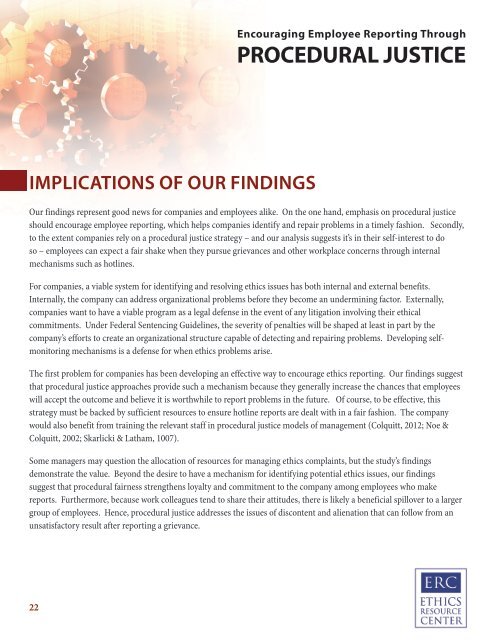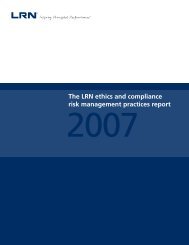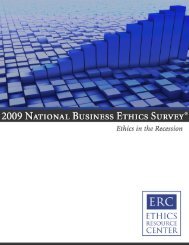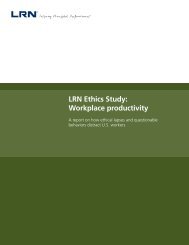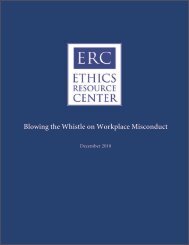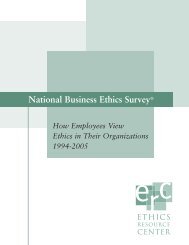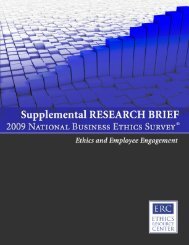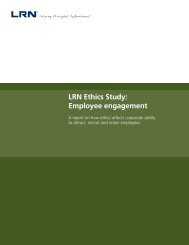PROCEDURAL JUSTICE - Ethics Resource Center
PROCEDURAL JUSTICE - Ethics Resource Center
PROCEDURAL JUSTICE - Ethics Resource Center
You also want an ePaper? Increase the reach of your titles
YUMPU automatically turns print PDFs into web optimized ePapers that Google loves.
Encouraging Employee Reporting Through<br />
<strong>PROCEDURAL</strong> <strong>JUSTICE</strong><br />
IMPLICATIONS OF OUR FINDINGS<br />
Our findings represent good news for companies and employees alike. On the one hand, emphasis on procedural justice<br />
should encourage employee reporting, which helps companies identify and repair problems in a timely fashion. Secondly,<br />
to the extent companies rely on a procedural justice strategy – and our analysis suggests it’s in their self-interest to do<br />
so – employees can expect a fair shake when they pursue grievances and other workplace concerns through internal<br />
mechanisms such as hotlines.<br />
For companies, a viable system for identifying and resolving ethics issues has both internal and external benefits.<br />
Internally, the company can address organizational problems before they become an undermining factor. Externally,<br />
companies want to have a viable program as a legal defense in the event of any litigation involving their ethical<br />
commitments. Under Federal Sentencing Guidelines, the severity of penalties will be shaped at least in part by the<br />
company’s efforts to create an organizational structure capable of detecting and repairing problems. Developing selfmonitoring<br />
mechanisms is a defense for when ethics problems arise.<br />
The first problem for companies has been developing an effective way to encourage ethics reporting. Our findings suggest<br />
that procedural justice approaches provide such a mechanism because they generally increase the chances that employees<br />
will accept the outcome and believe it is worthwhile to report problems in the future. Of course, to be effective, this<br />
strategy must be backed by sufficient resources to ensure hotline reports are dealt with in a fair fashion. The company<br />
would also benefit from training the relevant staff in procedural justice models of management (Colquitt, 2012; Noe &<br />
Colquitt, 2002; Skarlicki & Latham, 1007).<br />
Some managers may question the allocation of resources for managing ethics complaints, but the study’s findings<br />
demonstrate the value. Beyond the desire to have a mechanism for identifying potential ethics issues, our findings<br />
suggest that procedural fairness strengthens loyalty and commitment to the company among employees who make<br />
reports. Furthermore, because work colleagues tend to share their attitudes, there is likely a beneficial spillover to a larger<br />
group of employees. Hence, procedural justice addresses the issues of discontent and alienation that can follow from an<br />
unsatisfactory result after reporting a grievance.<br />
22


